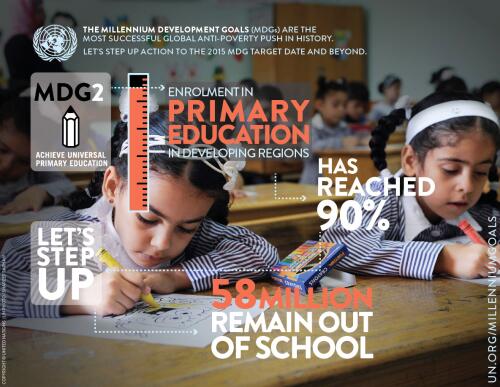Radical Goals for Sustainable Development
A meeting at the United Nations this week is set to change the trajectory of our collective future. Over 100 heads of state will meet in New York for the Sustainable Development Summit to adopt an ambitious development agenda that, according to a UN press release, "will end poverty and promote prosperity by 2030, while addressing the environment."
Seventeen new "Sustainable Development Goals" will be adopted at the meeting. The new SDGs can be boiled down to three fundamental challenges: 1) ending extreme poverty, 2) fighting inequality and injustice, 3) fixing climate change.
The SDGs stand to potentially challenge the framework of development as it has existed since the end of World War II. Here's how:
First, the goals are global, with challenging targets for all countries, meaning they demand change across the developing and the developed world. The SDGs thus could potentially alter long-standing divisions between these respective societies and economies. Second, the focus on sustainability is significant. A truly sustainable path toward development means challenging resource-intensive, polluting, and extractive forms of economic growth. That would represent a radical departure from "business as usual."
We've (Sort of) Been Here Before
In 2000, a similar meeting of world leaders resulted in the establishment of eight key anti-poverty targets called "The Millennium Development Goals. The MDGs were aimed at making substantial improvements in developing countries by the end of 2015 within the areas of education, gender equality, child mortality, maternal health, disease, and the environment. Some of the MDG targets have been met (the most recent being a reduction in malaria deaths).
 This progress is laudable, but many challenges remain. For example, the second MDG sought to achieve "universal primary education" (in simple terms this means that all children of primary school age would be able to attend school). Today, there are still 58 million children who do not have access to a primary school education.
This progress is laudable, but many challenges remain. For example, the second MDG sought to achieve "universal primary education" (in simple terms this means that all children of primary school age would be able to attend school). Today, there are still 58 million children who do not have access to a primary school education.
A Challenging Paradigm Shift
Planet Aid applauds the establishment of the SDGs. We know that continued progress toward lasting development will be more difficult than in the past. It will require exactly the kind of paradigm shift proposed by the SDGs. Systemic changes are needed in our basic economic relationships, and progress will be elusive if the developed world is allowed to continue to exploit the developing world and the planet as it has for so many years. Development must empower the poor to make changes in their lives and give them access to vital resources and information.
